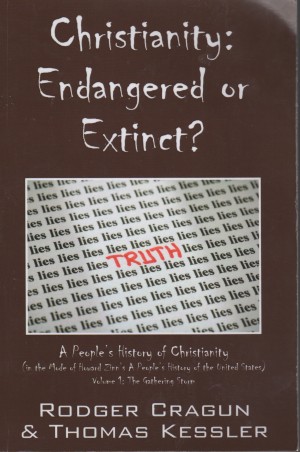
Christianity: Endangered or Extinct? by Rodger Cragun and Thomas Kessler (2014. Outskirts Press. ISBN 978-1-4787-2082-9)
Just as he did in his solo effort, The Ultimate Heresy, theologian Cragun takes on modern Christianity with a fervor and resolve in this new work, written in collaboration with former Franciscan monk Kessler, that invokes the passion of Christ. Whereas, Heresy shares the philosophical and spiritual complexity of this new volume in terms of scholarship, being formed around a simple idea or truth, that The Word referenced in New Testament scripture is the person of Jesus Christ, not the words written in Biblical passages, here Cragun and Kessler attempt to chart the history of early Christianity with an eye towards debunking much of what we know and believe to be the tenets of the faith.
Beginning with an examination of early church leaders like Marcion, the Gnostics, Tertullian, and the Montantist women (Quintilla and Priscilla), the authors chart a course of discourse that strips away the Greek and Roman philosophy grafted onto Christ’s truths by early, institutionally oriented clerics. The problem, according to the authors, is that the humble origins of one of the world’s great faiths became integrated into the secular fabric of empire, specifically the Roman Empire. It is this usurping of Jesus’ core values (followed to a large extent by the Montanists who were labeled heretics by Rome) that Cragun and Kessler argue has been the downfall of a true and complete understanding of Christ’s teachings and message. And they lay blame for the loss of Jesus’ original intent squarely at the feet of Rome.
This is not an easy book to read. And, truth be told, the historical documentation relied upon as scholarly support for the authors’ main premise is based upon bits and pieces of letters, diary entries, lost scripture, third and fourth hand accounts, and the like; slender evidence to be sure as proof of such a bold and brazen argument. There is much here that will likely cause devote Roman Catholics and mainstream Protestants to toss the book across the room. And yet, there is a ring of truth to what the authors postulate.
My main criticisms of Endangered is that the authors are attempting to simplify complex, historical and religious perspectives for consumption by non-theologians. Cragun and Kessler are only partly successful in doing so. The language and reasoning of Endangered doesn’t quite level the playing field so that ordinary, non-Seminary trained eyes and minds can always understand the points being raised. That’s criticism number one: the prose never quite becomes basic enough for a lay reader to easily grasp the gist of the authorial argument. Addtionally, the last section of the book, in which the authors attempt to link the the Roman Catholic Church’s present day sexual scandal to the branding of Marcion and other early church leaders as heretics, feels forced. The contention that the early stifling of dissent within Christianity somehow caused the present, systemic sexual dysfunction within the Catholic Church, coming late in the book and seemingly out of nowhere, doesn’t really add to the reader’s understanding of the authors’ main point: That the institutionalization of Christianity is a far cry from the egalitarian words and intentions of Jesus.
This is a worthy read for anyone interested in learning something about the early Christian faith as reconstructed by the authors. Projected as the first in a series of the People’s History of Christianity, I will indeed read the next installment despite the book’s shortcomings.
3 and 1/2 stars out of 5.


